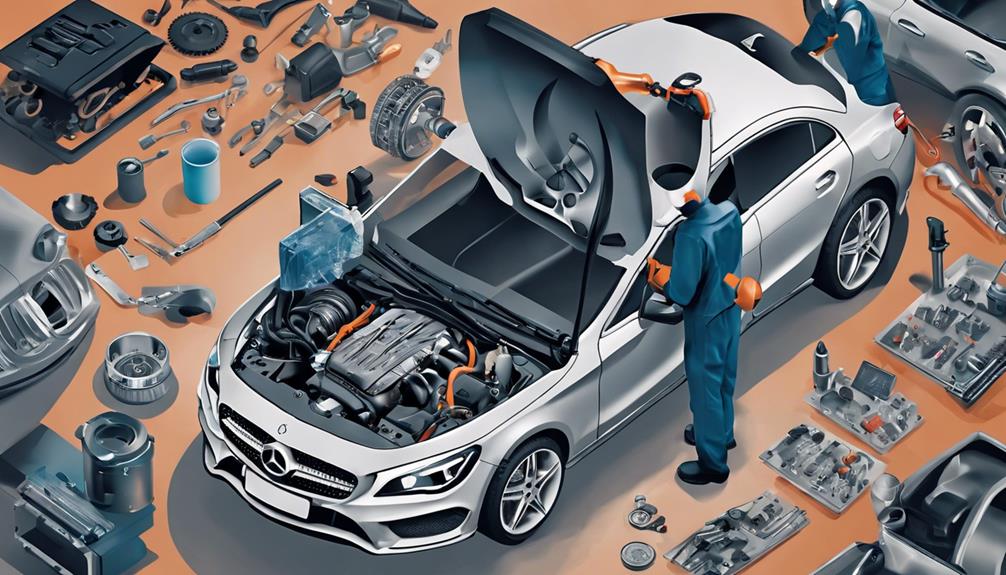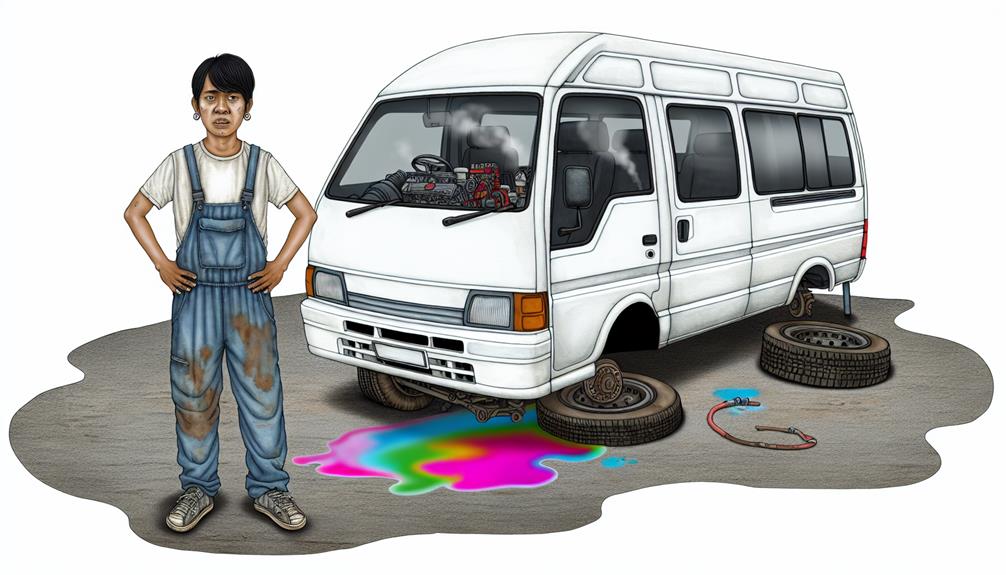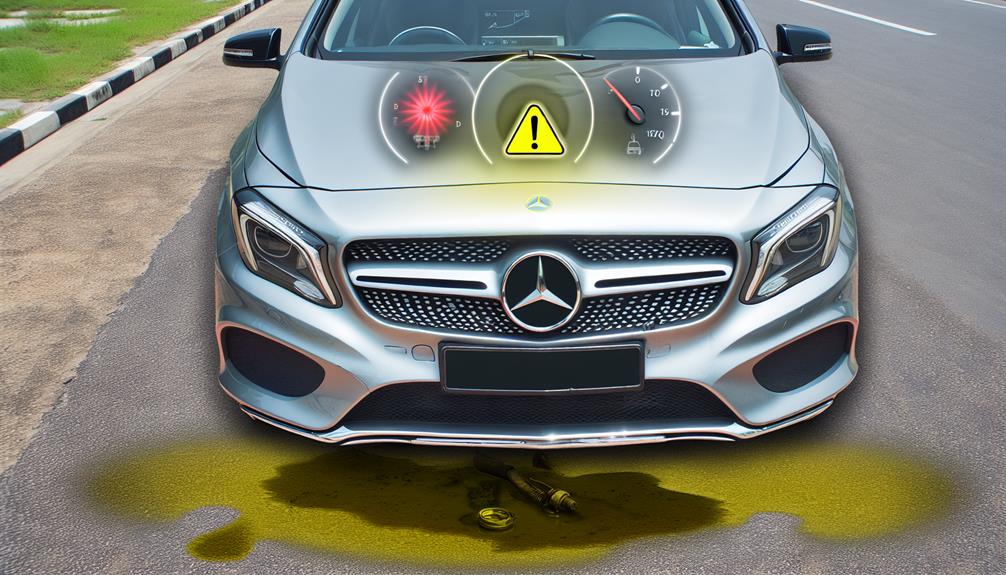If you own a Mercedes CLA250, you should watch out for transmission oil leaks causing oil puddles and immediate inspection needs to prevent further damage. Fuel injector issues may also arise, decreasing fuel efficiency, while burning smells could stem from engine overheating or electrical malfunctions. Steering problems like alignment issues or tire pressure imbalances can affect handling, stressing the need for prompt attention and regular maintenance checks.
Ensuring you stay informed about recalls, address issues promptly, and follow manufacturer's guidelines can help prevent costly repairs. Remember to prioritize routine service intervals, fluid checks, and brake inspections for best performance and longevity. Becoming aware of these common problems is essential for maintaining your vehicle's peak condition and preventing future issues.
Key Takeaways
- Transmission issues like leaks and overheating require immediate inspection to prevent damage.
- Fuel system problems such as injector issues and leaks necessitate staying informed about recalls.
- Burning smells may stem from engine overheating or electrical malfunctions, requiring immediate action.
- Steering and handling concerns like alignment issues and tire pressure imbalances affect performance.
- Regular maintenance, specialized expertise, and prompt issue attention are vital for optimal CLA250 performance.
Transmission Oil Leaks

If you notice oil puddles under your Mercedes CLA250, it may be a sign of transmission oil leaks that require immediate inspection. Common CLA transmission oil leaks can stem from damaged seals and gaskets in the gearbox or transmission system. These leaks, if left unchecked, can lead to potential damage to surrounding components and result in overheating transmission fluid.
Repairing transmission oil leaks in your Mercedes CLA250 is vital to prevent more severe transmission issues in the future. The costs for fixing these leaks can vary depending on the extent of the damage and the parts needed for replacement.
Regular maintenance is key to detecting and addressing any leaking transmission oil promptly. If you start noticing a burnt odor or experience issues with shifting gears, it's important to get your vehicle inspected by a professional to prevent further damage. Taking care of transmission oil leaks early can save you from costly repairs down the line and guarantee the smooth operation of your Mercedes CLA250.
Fuel Injector Issues
Fuel injector leaks can pose significant concerns for owners of Mercedes CLA models, affecting both gasoline and diesel engines. These leaks can lead to various issues, such as decreased fuel efficiency and engine performance.
To provide you with a better understanding of fuel injector problems in your Mercedes CLA, consider the following points:
- Leak Locations: O-rings and seals in the fuel injectors are common points of leakage, potentially causing fuel to escape and impacting engine operation.
- Recall Information: Stay informed about any available recall information related to fuel injector leaks for your specific Mercedes CLA model to address potential issues promptly.
- Preventive Maintenance: Regular maintenance checks and timely inspections can help prevent fuel injector leaks in your Mercedes CLA, saving you from costly repairs down the road.
Being aware of these key aspects can assist you in maintaining the health and performance of your Mercedes CLA vehicle. Remember, proactive care plays a crucial role in addressing fuel injector concerns before they escalate.
Burning Smell Causes

If you notice a burning smell in your Mercedes CLA250, it may stem from engine overheating or electrical malfunctions. Overheated transmission fluid can also be a culprit, particularly if it emits a plastic-like odor.
Addressing these potential causes promptly is important to prevent further damage and maintain the vehicle's performance.
Engine Overheating
Engine overheating in the Mercedes CLA250 can result in a distinct burning smell, often attributed to overheated transmission fluid. When this occurs, it's vital to address the issue promptly to prevent further damage to your vehicle. The burning smell could indicate potential mechanical problems that need immediate attention.
To better understand engine overheating in your Mercedes CLA250, consider the following:
- Regular maintenance checks are essential to prevent engine overheating.
- Immediate action upon detecting burning smells can help avoid severe issues.
- Overheated transmission fluid is a common cause of the burning smell, signaling possible mechanical concerns.
Being proactive in addressing engine overheating can prolong the life of your Mercedes CLA250 and save you from costly repairs.
Electrical Malfunctions
When experiencing a burning smell in your Mercedes CLA, electrical malfunctions could be the underlying cause that demands immediate attention for diagnosis and repair.
Reported problems with Mercedes CLA250 often include burning smells resulting from overheated transmission fluid or electrical component issues. If you detect a distinct burnt odor, it could indicate overheating of transmission fluid due to leaks or malfunctions, emphasizing the need for prompt investigation.
Addressing these issues promptly is vital for maintaining the safety and performance of your vehicle. To guarantee your Mercedes CLA operates smoothly, it's essential to identify and resolve any electrical malfunctions contributing to the burning smell promptly.
Regular maintenance checks can help prevent such reported problems and keep your car running efficiently.
Steering Problems
Experiencing the sensation of your Mercedes CLA250's steering wheel turning right on its own may signal underlying alignment issues or worn-out steering components. Along with these factors, imbalances in tire pressure can also contribute to steering problems in your Mercedes CLA250. Here are some important points to keep in mind:
- Alignment Issues: Misaligned wheels can cause your steering wheel to veer to one side, affecting the overall handling and stability of your vehicle.
- Tire Pressure Imbalances: Fluctuations in tire pressure can lead to uneven wear on the tires, affecting how the car responds to steering inputs.
- Suspension System Problems: Issues with the suspension system can impact how your vehicle handles and steers, requiring immediate attention to prevent further damage.
It's vital to address these steering problems promptly to ensure your Mercedes CLA250 maintains peak performance and safety on the road. Remember, regular maintenance and inspections can help prevent these issues from escalating.
Maintenance Recommendations

You should adhere to routine service intervals to keep your Mercedes CLA250 in top condition. Regular fluid checks and changes, along with inspections of brakes and other key components, are essential for maintaining performance and safety.
Following these maintenance recommendations can help you avoid costly repairs and lengthen the lifespan of your vehicle.
Routine Service Intervals
For best performance and longevity of your Mercedes CLA250, adhering to the recommended routine service intervals set by Mercedes-Benz is essential. Here are some key points to ponder regarding maintenance cost:
- Timely Maintenance: Regular service intervals every 10,000 miles or 1 year help prevent costly repairs down the line.
- Preventative Tasks: Regular oil changes, filter replacements, tire rotations, and brake inspections are vital to avoid expensive issues.
- Long-Term Benefits: Following the manufacturer's service schedule not only saves you money in the long run but also secures your vehicle's reliability and resale value.
Fluid Checks and Changes
Regularly inspecting and changing fluids is essential for maintaining peak performance and extending the lifespan of your Mercedes CLA250. Recommended fluid changes for your Mercedes CLA include engine oil, transmission fluid, brake fluid, and coolant. Neglecting these maintenance tasks can lead to increased wear and tear on important components, potentially resulting in costly repairs down the line.
Inspection of Brakes
To maintain the best performance and safety of your Mercedes CLA250, regular inspections of the brakes are essential every 10,000-20,000 miles. Here are some key maintenance recommendations to keep your Mercedes-Benz CLA's brakes in top condition:
- Check brake pads for wear indicators and thickness, aiming for at least 1/4 inch of pad material.
- Monitor brake fluid levels and condition, replacing fluid every 2 years or as per manufacturer recommendations.
- Inspect brake rotors for warping, scoring, or uneven wear to prevent brake pulsation or noise issues.
Following these steps will help ensure your Mercedes CLA250's braking system operates optimally, providing you with a safe and smooth driving experience.
Professional Diagnosis Importance

Ensuring a professional diagnosis for your Mercedes CLA250 is paramount for accurately identifying and resolving any potential issues with precision and efficiency. CLA250 vehicles require specialized tools and expertise for a thorough evaluation of their systems.
Diagnostic equipment plays a vital role in pinpointing specific issues that mightn't be easily noticeable during a visual inspection. Technicians trained in Mercedes-Benz vehicles possess the knowledge to provide detailed diagnostics, ensuring that repairs are carried out with precision.
Prompt Issue Attention
Addressing common issues promptly in your Mercedes CLA250 is important to prevent further damage and guarantee peak performance. When it comes to maintaining your vehicle, certain problems are worth checking without delay:
- Water Pump Failures: Timely attention to any signs of water pump issues can prevent overheating and potential engine damage.
- Rear Differential Problems: Promptly addressing rear differential issues can ensure peak power distribution and prevent further drivetrain complications.
- Rattling Panoramic Roofs: Immediate action on rattling sounds from the panoramic roof can prevent leaks and potential structural damage.
Prevention Strategies

Implementing a proactive approach to maintenance plays a vital role in safeguarding your Mercedes CLA250 against common issues and ensuring peak performance. Regularly scheduled maintenance, including oil changes and fluid checks, can help prevent common issues in this luxury compact vehicle. Addressing any unusual smells or sounds promptly and having them inspected by a professional can prevent potential problems from escalating. Proper tire maintenance, such as regular pressure checks and rotations, can improve overall vehicle performance and prevent steering and suspension issues. Following the manufacturer's guidelines for service intervals and inspections can help detect and address issues early, reducing repair costs in the long run. Keeping your Mercedes CLA250 clean and well-maintained, both inside and out, can contribute to its overall longevity and prevent cosmetic and interior problems.
| Prevention Strategies | Description | Benefits |
|---|---|---|
| Regular Maintenance | Includes oil changes, fluid checks to prevent common issues | Ensures peak performance |
| Addressing Issues Promptly | Checking for unusual smells or sounds can prevent problems from escalating | Avoids costly repairs |
| Proper Tire Maintenance | Regular pressure checks and rotations improve performance, prevent steering and suspension issues | Enhances overall vehicle handling and safety |
| Manufacturer's Guidelines | Following service intervals and inspections can detect issues early, reducing long-term repair costs | Ensures the vehicle is well-maintained according to manufacturer's standards |
| Cleanliness is Key | Keeping the vehicle clean inside and out contributes to longevity, prevents cosmetic and interior issues | Maintains the luxury appearance and functionality of the Mercedes CLA250 |
Addressing Common Problems
To effectively resolve common issues with your Mercedes CLA250, proactive identification and timely intervention are key components for maintaining the vehicle's peak performance.
When addressing common problems, feel free to take the following steps:
- Regular Inspection: Conduct routine checks on your seat belts to prevent fraying and potential cosmetic damage to interior side pillars.
- Timely Maintenance: Keep an eye on the water pump to catch any signs of failure early, as this component often requires replacement.
- Professional Evaluation: If you experience rattling associated with the panoramic roof or suspect rear differential issues, don't hesitate to seek expert assistance to diagnose and address these problems promptly.
Frequently Asked Questions
Is Mercedes CLA 250 a Reliable Car?
Yes, the Mercedes CLA 250 is a reliable car overall. While it may require more frequent visits for minor issues, the likelihood of a major problem is low. With regular maintenance, you can enjoy a dependable driving experience.
Does the CLA250 Have a Lot of Problems?
Yes, the CLA250 can have several issues like fraying seat belts, water pump failures, and rear differential problems. Some owners also report rattling from the panoramic roof and transmission concerns. Dealers address these by replacing parts.
Is a Mercedes CLA 250 Expensive to Maintain?
Maintaining a Mercedes CLA 250 can be pricier than average. Expect moderate maintenance costs with more frequent minor repairs. While not overly expensive, routine visits to the shop are common to keep your car in top shape.
What Is the Life Expectancy of a Mercedes CLA 250?
With proper maintenance and care, your Mercedes CLA 250 can last well beyond 100,000 miles. Factors like driving habits and adherence to maintenance schedules influence longevity. Some owners have seen their vehicles exceed 200,000 miles with no major issues.
Conclusion
To sum up, being mindful of typical issues with the Mercedes CLA250 can help you tackle problems promptly and prevent expensive repairs down the road.
From transmission oil leaks to steering issues, staying on top of maintenance recommendations and seeking professional diagnosis when necessary is essential.
By taking proactive steps to tackle these issues, you can guarantee your Mercedes CLA250 remains in top condition for years to come.









